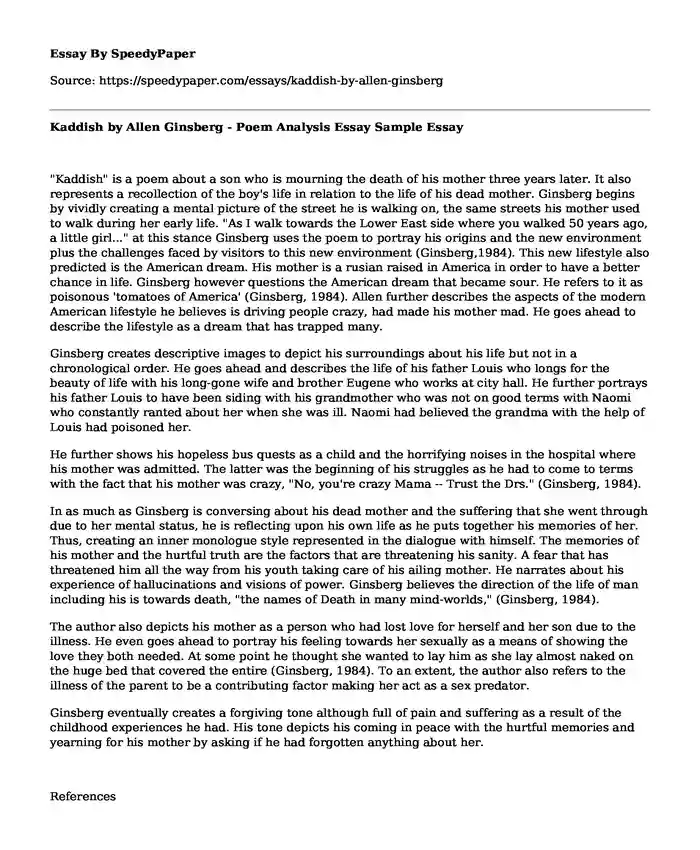"Kaddish" is a poem about a son who is mourning the death of his mother three years later. It also represents a recollection of the boy's life in relation to the life of his dead mother. Ginsberg begins by vividly creating a mental picture of the street he is walking on, the same streets his mother used to walk during her early life. "As I walk towards the Lower East side where you walked 50 years ago, a little girl..." at this stance Ginsberg uses the poem to portray his origins and the new environment plus the challenges faced by visitors to this new environment (Ginsberg,1984). This new lifestyle also predicted is the American dream. His mother is a rusian raised in America in order to have a better chance in life. Ginsberg however questions the American dream that became sour. He refers to it as poisonous 'tomatoes of America' (Ginsberg, 1984). Allen further describes the aspects of the modern American lifestyle he believes is driving people crazy, had made his mother mad. He goes ahead to describe the lifestyle as a dream that has trapped many.
Ginsberg creates descriptive images to depict his surroundings about his life but not in a chronological order. He goes ahead and describes the life of his father Louis who longs for the beauty of life with his long-gone wife and brother Eugene who works at city hall. He further portrays his father Louis to have been siding with his grandmother who was not on good terms with Naomi who constantly ranted about her when she was ill. Naomi had believed the grandma with the help of Louis had poisoned her.
He further shows his hopeless bus quests as a child and the horrifying noises in the hospital where his mother was admitted. The latter was the beginning of his struggles as he had to come to terms with the fact that his mother was crazy, "No, you're crazy Mama -- Trust the Drs." (Ginsberg, 1984).
In as much as Ginsberg is conversing about his dead mother and the suffering that she went through due to her mental status, he is reflecting upon his own life as he puts together his memories of her. Thus, creating an inner monologue style represented in the dialogue with himself. The memories of his mother and the hurtful truth are the factors that are threatening his sanity. A fear that has threatened him all the way from his youth taking care of his ailing mother. He narrates about his experience of hallucinations and visions of power. Ginsberg believes the direction of the life of man including his is towards death, "the names of Death in many mind-worlds," (Ginsberg, 1984).
The author also depicts his mother as a person who had lost love for herself and her son due to the illness. He even goes ahead to portray his feeling towards her sexually as a means of showing the love they both needed. At some point he thought she wanted to lay him as she lay almost naked on the huge bed that covered the entire (Ginsberg, 1984). To an extent, the author also refers to the illness of the parent to be a contributing factor making her act as a sex predator.
Ginsberg eventually creates a forgiving tone although full of pain and suffering as a result of the childhood experiences he had. His tone depicts his coming in peace with the hurtful memories and yearning for his mother by asking if he had forgotten anything about her.
References
Ginsberg, A. (1984). Collected poems, 1947-1980. HarperCollins Publishers.
Cite this page
Kaddish by Allen Ginsberg - Poem Analysis Essay Sample. (2022, Jun 10). Retrieved from https://speedypaper.net/essays/kaddish-by-allen-ginsberg
Request Removal
If you are the original author of this essay and no longer wish to have it published on the SpeedyPaper website, please click below to request its removal:
- Free Essay Example on Organizational Culture Theories
- Communication as Medical Billing Officer - Essay Example
- Essay Sample on the Reproductive Health Policy in Venezuela
- Paper Example. Funding Consideration for Swimming Classes in Bridgeport
- Paper Example on Technological Application in Bloodstain Pattern Interpretation
- Paper Example. Ajman Digital Transformation Programme
- Free Essay. How Citizens and Military Handle Gojira
Popular categories





